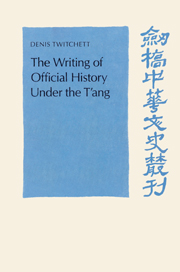Book contents
- Frontmatter
- Contents
- Preface
- Conventions
- List of abbreviations
- Part I The bureaucratic apparatus
- Part II The compilation of the historical record
- Part III The Chiu T'ang shu
- 12 The compilation of the Chiu T'ang shu
- 13 The Chiu T'ang shu and its sources: the Basic Annals
- 14 The Chiu T'ang shu and its sources: the monographs
- Appendix: Derivation of the Basic Annals chapters of Chiu T'ang shu
- Bibliography
- Index
14 - The Chiu T'ang shu and its sources: the monographs
Published online by Cambridge University Press: 03 November 2009
- Frontmatter
- Contents
- Preface
- Conventions
- List of abbreviations
- Part I The bureaucratic apparatus
- Part II The compilation of the historical record
- Part III The Chiu T'ang shu
- 12 The compilation of the Chiu T'ang shu
- 13 The Chiu T'ang shu and its sources: the Basic Annals
- 14 The Chiu T'ang shu and its sources: the monographs
- Appendix: Derivation of the Basic Annals chapters of Chiu T'ang shu
- Bibliography
- Index
Summary
The various monographs included in the Chiu T'ang shu have been the subject of a large body of scholarship. I propose here to concentrate on the most important questions: How and when were the extant monographs written? Did the compilers inherit monographs from Liu Fang's National History or even from one of the earlier National Histories and update them by adding material on the period after 758–60, or were they written completely ab initio in the 940s?
This is more than a purely academic question. The monographs approach perhaps more nearly than any other section of the traditional Standard Histories our modern conception of “problem-focused” historical writing, and attempt more than other parts of the dynastic histories to follow problems from beginning to end and to establish a causal nexus between events. Their importance for the modern historian is reflected in the number of western translations based on them. Because each of them has a preface that sets out to present a brief but coherent interpretation of the area of institutional history covered by the monograph, it is important to discover whether these interpretations view developments from the standpoint of the time when Liu Fang hastily compiled his National History, during the still unresolved wartime crisis of the An Lu-shan rebellion in the late 750s, or from a period nearly two centuries later, in 941–5, when the T'ang had finally fallen, the empire had been fragmented, and the historians needed above all to address the reasons for the dynasty's final collapse.
- Type
- Chapter
- Information
- The Writing of Official History under the T'ang , pp. 206 - 236Publisher: Cambridge University PressPrint publication year: 1992

